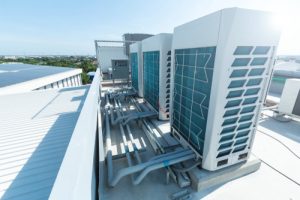 Some Benefits of Rooftop HVAC Units
Some Benefits of Rooftop HVAC Units
As commercial property owners and managers, selecting an appropriate heating, ventilation, and air conditioning (HVAC) system for your building is a crucial decision. With so many options available, you have to weigh the benefits and drawbacks of each system to ensure you select the best solution for your building. One increasingly popular option is rooftop HVAC units, and in this post, we’ll explore some of the benefits of this system.
Easy Access for Maintenance
One of the most critical benefits of a rooftop HVAC unit is ease of access for maintenance. Since the system is installed on the rooftop, it doesn’t take up valuable indoor space as a centralized system would.
This accessibility allows maintenance technicians to quickly and easily access the system for routine maintenance like changing air filters and verifying the unit is working correctly. This approach also makes repairs quicker as technicians don’t have to navigate hallways, multiple floors, and lobbies to reach the HVAC system. The ease of access reduces downtime, which is crucial to maintaining the building’s comfortable temperature at all times.
Improved Energy Efficiency
Another significant benefit of rooftop HVAC units is that they improve your commercial building’s energy efficiency. Rooftop HVAC systems are highly efficient because of their centralized design. These units cool and heat the air directly at the source rather than requiring lengthy ductwork to transport cool or warm air to various areas of the building. The shorter the ductwork is, the less energy is required to pump the air to and from the HVAC system, resulting in considerable energy savings.
Additionally, rooftop units are designed to provide individual or zoned climate control. This control means that you don’t have to heat or cool an entire floor or internal space to achieve the desired temperature in one area. This approach can save you a lot of money as you only heat or cool the areas you need to, reducing your energy bills.
Better Air Quality
Another benefit of installing rooftop HVAC units is the improved air quality it provides for your commercial building. Rooftop HVAC units are designed to maximize indoor air quality by filtering and sterilizing the air. With rooftop units, it’s easier to maintain high-quality air since there is no ducting. Thus, before the air is pumped into the building’s interior spaces, it passes through an efficiently filtered air system, removing pollen, pollutants, and other contaminants from the air. This cleaner air minimizes health risks to occupants, reducing instances of respiratory problems or allergies, and creating a healthy working environment.
Greater Flexibility
Rooftop HVAC systems offer greater flexibility in terms of design, placement, and zoning. They can be installed on the exterior of the building or in a secluded mechanical place where occupants would not be affected if you need to upgrade or replace the system.
Additionally, the rooftop HVAC units provide businesses with a unique opportunity to set zoning areas, allowing different temperature settings in discreet areas of commercial space. This flexibility is especially useful for larger commercial spaces with multiple tenants who require different temperature settings.
Less Noise Pollution
Traditional HVAC systems like packaged systems or split systems can be noisy. The sound of an AC running all day and night can be intrusive, disturbing occupants and interrupting workflow. Rooftop HVAC units are designed to mitigate noise pollution by operating at a more substantial distance from your commercial space’s occupants.
Since the HVAC installation is made on top of the building, the noise that comes from the system is vastly decreased. There’s also a layer of sound proofing material that dampens any noise from the unit. So, not only are you given high-quality comfort, but you’re also given peace and quiet.
Cost-Effective
Rooftop HVAC units are cost-effective for several reasons. First, the units are an efficient way to cool or heat a commercial space. Second, the HVAC unit is typically outside, so there is less required ductwork, making it an affordable option for commercial building owners.
Rooftop HVAC units have the advantage of using multiple units to achieve the same output as a single centralized system. This setup reduces capital expenditure and running costs, helping commercial building owners save significant operational costs like energy expenses and maintenance costs.
Final Thoughts
Investing in a rooftop HVAC unit is a sensible choice for commercial building owners who want to improve energy efficiency, air quality, increase flexibility, remain cost effective and support a peaceful and quiet work environment. Due to the benefits of rooftop HVAC units, they’re a perfect choice for all commercial spaces looking for an HVAC upgrade. Contact an experienced HVAC professional to learn more about the advantages of rooftop HVAC systems and see if they’re right for your business building.
